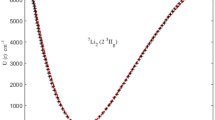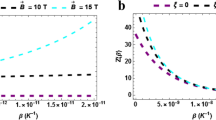Abstract
FOR diatomic homopolar molecules the bond-forming electrons are imagined to be concentrated within the region of the two nuclei and to experience the attractions of the different centres. The resulting torque causes a continual transference of angular momentum between the electron and the nuclei, and, as has been shown by Van Vleok, the average square of the electronic angular momentum, and hence of the magnetic moment, does not vanish even for 1S state of the molecule. This causes a loss in diamagnetism the magnitude of which is proportional to the degree of concentration of charge within the region between the nuclei; this concentration is also responsible for the more essential part of the binding energy of a homopolar molecule. Hence for diatomic homopolar molecules we should expect that the loss in diamagnetism on molecule formation will be proportional to the binding energy.
This is a preview of subscription content, access via your institution
Access options
Subscribe to this journal
Receive 51 print issues and online access
$199.00 per year
only $3.90 per issue
Buy this article
- Purchase on Springer Link
- Instant access to full article PDF
Prices may be subject to local taxes which are calculated during checkout
Similar content being viewed by others
Author information
Authors and Affiliations
Rights and permissions
About this article
Cite this article
RAY-CHANDHURI, D. Dianaagnetism of Molecules. Nature 130, 579–580 (1932). https://doi.org/10.1038/130579b0
Issue Date:
DOI: https://doi.org/10.1038/130579b0
Comments
By submitting a comment you agree to abide by our Terms and Community Guidelines. If you find something abusive or that does not comply with our terms or guidelines please flag it as inappropriate.



